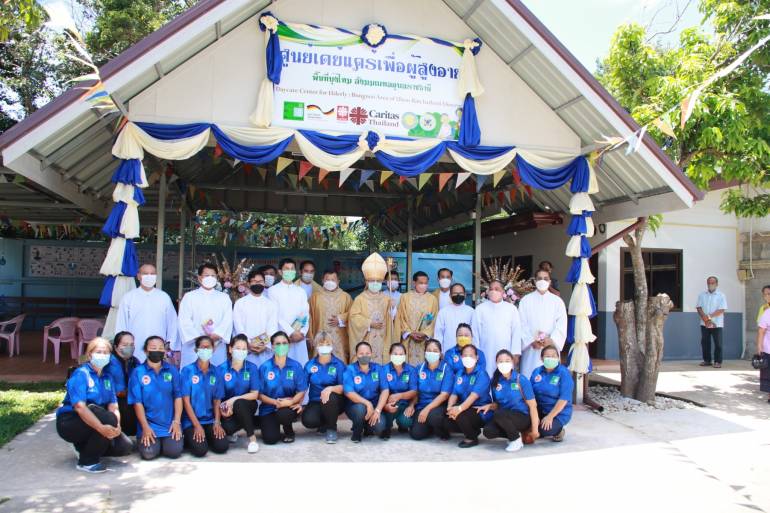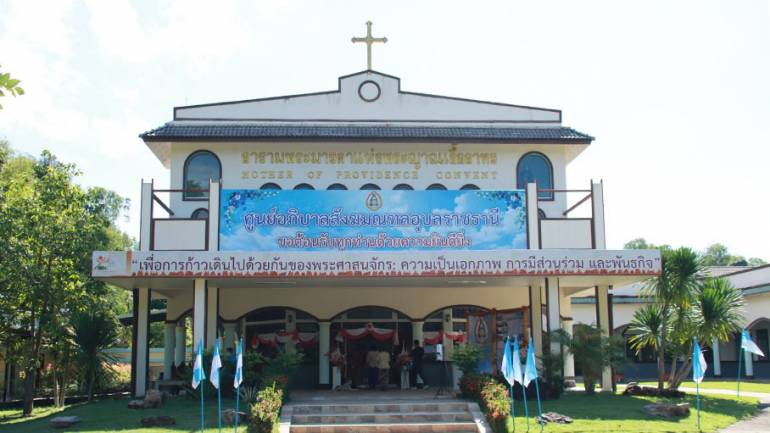Pastoral and Daycare Center: Thailand's new missionary service

The Pastoral and Day Care Centers are at the heart of the new missionary strategy in the Ubon Ratchathani Diocese, north-east Thailand.
Redemptorist Bishop Philip Banchong Chaiyara blessed the new Pastoral and Day Care Center in Ubon Ratchathani, to spread the Good News of Jesus to the poor.
On August 29, Redemptorist Mons. Philip Banchong Chaiyara presided over the blessing of the new pastoral and daycare center for the elderly of the Ubon Ratchathani diocese.
Caritas Thailand secretary, Camillian Father Pairat Sripraseat, also attended the ceremony.
This event witnessed the continued evolution and updating of the missionary strategy in the church.
The missionary activity of the church is always challenged by the evolution of the society in which it operates. That’s why the church has to be flexible and always in touch with society to meet its urgent present needs.
The new Pastoral and Daycare Center building was formerly the Clarisse Capucine Mother of Providence monastery.
The Sister’s congregation experienced a deep crisis; their number decreased dramatically, and there was no more personnel to take care of the convent.
The Ubon Ratchathani diocese took over the convent in June 2018, and Father Pradapsin Duangthong, a diocesan priest, started to renovate and adjust the building according to the new needs of the diocese.
After two-three months, the pastoral session offices of the diocese moved in, but Mons. Chaiyara, Caritas Thailand president, and his clergy have a wider plan for the building.
In keeping with Pope Francis' inspiring words and eagerness to keep the diocese's administration in touch with pastoral work in the field, they decided that the new building could meet the needs of the elderly in the area.

In Thailand, the population is aging and the government is not yet ready to take care of this emergency.
The Buddhist-majority country "has experienced a substantial fertility decline since the 1960s, largely due to the nationwide success of its voluntary family planning program.
In just one generation, the total fertility rate (TFR) shrank from 6.5 children per woman in the 1960s to below the replacement level of 2.1 in the late 1980s."
The elderly people are usually dependent on their younger relatives in the family, especially the siblings, and they could survive because of their care, but the situation has changed in Thailand.
Urbanization, the economic crisis, and the young population contraction expose the elderly to uncertainty and, often, poverty.
The villages in Thailand are the places for old people and kids because the working-age population usually moves to the cities, leaving the elderly alone with nieces and nephews to care for.
The Ubon Ratchathani diocese, situated in the northeastern rural area of Thailand, is not an exception.
The elderly people are stuck in the villages with little means of support. This is the reason why the diocese decided to give a clear sign of its commitment to favoring the poorest and opened a daycare center for the elderly too. They enlarged the old convent and created a welcoming area for the elderly.
The Daycare Center was established on July 26 with the help of the diocese social office affairs and Caritas Thailand.
The main aim of the structure is to help people with mobility difficulties, people who are alone or affected by depression, and other psychological problems.
The Day Care Center welcomes all elderly people in the area, not just Catholics.
The diocese social office decided to involve all the 12 local communities where the center is located, the local health network, and social services in the area.
At the moment, 23 volunteers work at the daycare center already.
At the same time, Mons. Chaiyara said that the new Pastoral and Day Care Center aims to spread the Good News of solidarity and love. It answers the urgent needs of the poor, so that such an experience could foster the faith of the Catholic population and, at the same time, become a sign of hope and love for all the people present in the area. In one word, this is the new evangelization. - Domenico Rodighiero
Radio Veritas Asia (RVA), a media platform of the Catholic Church, aims to share Christ. RVA started in 1969 as a continental Catholic radio station to serve Asian countries in their respective local language, thus earning the tag “the Voice of Asian Christianity.” Responding to the emerging context, RVA embraced media platforms to connect with the global Asian audience via its 21 language websites and various social media platforms.














